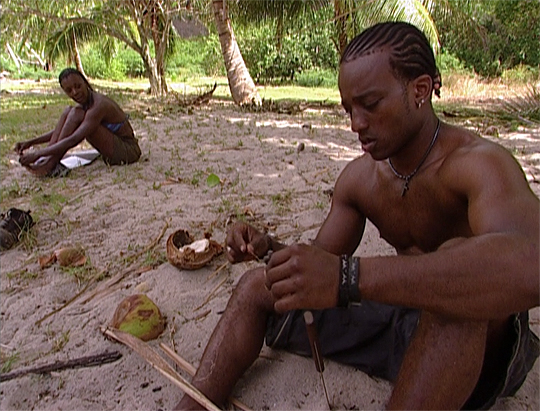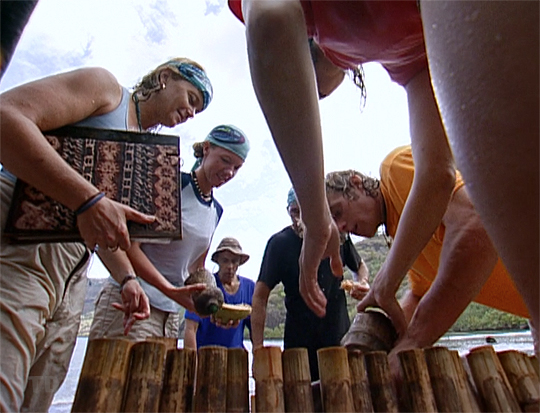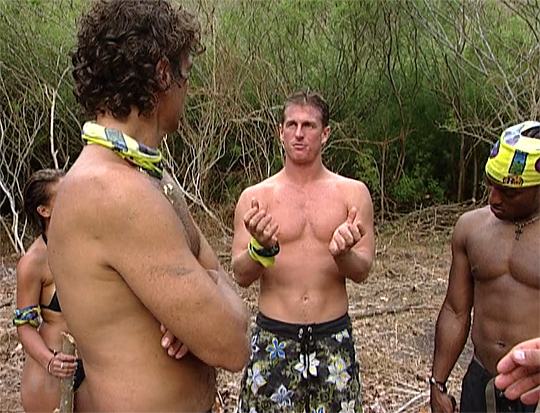

Survivor: Marquesas is an important season for a number of reasons. It was a return to the show's Pacific island roots, after wandering through the desert of dusty inland locations in The Australian Outback and Africa. (Technically this was Plan B: the original plan was to film in Jordan, until 9/11 made that untenable.) Strategically, it marked a step forward in gameplay, as the first time a group of outcasts gathered together and toppled an entrenched power structure, throwing a wrench into the already-calcified Pagonging strategy, a.k.a. "whichever original tribe has the most people at the merge just picks off the people from the other tribe." Most importantly, it was also the first season with a winner of color, Vecepia Towery. 18 years later Vee is still the show's only Black female winner, which is not great, but at the time, Survivor's set of four winners was amazingly diverse: an even split of two men and two women, among them one gay winner, a Jewish winner, and a Black winner. It truly felt like the show's premise was legitimate: *anyone* could play Survivor and win.
Marquesas is also Survivor at one of its first major transition points. One season earlier, the first twist — the tribe swap — was introduced. Here it will be done again, but in a different, more surprising manner, one which still would work today. If the desired goal of swaps was to encourage more fluid strategy and cross-tribal alliances, this time it succeeded, after failing in Africa. Inflexible alliances built along initial tribal lines is something that still bedevils the show to this day. Marquesas proved that it's always possible for those out of power to regain it, if they just work together ... even in these olden times, where idols and advantages were still but a distant dream.
So let's revisit this groundbreaking season together, shall we? Now with 2020 hindsight.
The marooning, now with increased hardship (and less)

The framing and pacing of the first two episodes feels a bit jarring to a modern audience. There is a *lot* of focus on camp life: making traps to find food, sharpening sticks to make spears, gathering and smashing snails, hiking as a group to a distant natural water source (a spring for Maraamu, a waterfall for Rotu ... no artificial wells in this era), and so on. Part of this is because of the shooting calendar: There is no RC in the premiere, and in the second episode, the RC happens on the second day, giving the tribes a full day to do nothing but "survive" after the first Tribal. Also, two of the three challenges are short rowing/ carrying-a-boat races, so they don't chew up much time.
The other main reason for the increased focus on camp life is, of course, that the show went overboard on trying to "toughen up" the experience, apparently due to the eternal refrain that "the show isn't about real survival any more," or whatever. Never mind that it's never been about "real survival." This is magical thinking that imagines an idealized past that never really was. This complaining about imaginary past seasons that nobody can actually point to specifically — seeing here that it was already prevalent in season four — that probably tells you all you need to know about how grounded in reality this argument is.
Despite that, Probst gloats in the opening minutes about how the tribes will receive no food whatsoever from production this season (except in rewards), and quite limited supplies, including no flint, ever. Never mind that everyone has sunglasses, multiple changes of clothes, life vests to use as pillows, and each tribe has a rubber raft that can double as either a comfy mattress or a tarp. Oh, and luxury items, including giant flags that can also be used as tarps, are still kosher.
Not giving the tribes rice is a fairly major issue, though, one that comes back to bite the show late in the game when everyone is spectacularly weakened from starvation, and Paschal almost dies. Yes, they have access to taro, citrus, and coconuts. But that's a lot of foraging work, and there's no real way to acquire protein, unless they're on the one tribe that won fishing gear. This was some poor decision-making, which the show seems to conveniently forget every few seasons, as in Ghost Island, where they cut the rice rations in half, just because.
The camp/survival stories drive in-camp conflict, which is probably the main incentive for the show to ratchet up the suffering. At the otherwise serene Rotu camp, Kathy wants fire and water and food, and nobody else seems to care all that much. It's a truly confusing narrative: Kathy's concerns seem perfectly reasonable, and the tribe's resistance to doing these obvious things is never really explained, and really only shown from Kathy's point of view. It seems unlikely that seven other people actually think food and water are optional, but since Kathy's a key season-long narrator, apparently we have to take things at face value? And there are a lot of unexplained disconnects in the narrative. Kathy causes a ruckus on the first day about the lack of fire, and everyone reluctantly pitches in to try. Then, after she insists they try again on the second day, she's nowhere to be seen when the Rotus finally succeed. It's weird. John and Gabe both seem sympathetic to Kathy's point of view, but also try to gently point out that by going off on her own to collect snails and clams, Kathy has separated herself from the rest of the tribe. In Kathy's favor, there's also a fair amount of misogyny here, with people like Paschal objecting to having a *woman* tell them what needs doing, but there also seems to be a healthy dose of miscommunication at fault, too. (Hot take: Boston Rob works tirelessly to claim the mantle, but Paschal is the actual villain of this season.)
For the people who want to see actual survival as the center of the show, good news: The first third of each episode is pretty much people talking about that. John builds a pig snare, which is pretty impressive. It doesn't catch anything, but still: there's your weekly dose of rugged survivalism. Rob chases a chicken, replete with traditional dodo music soundtrack. Again, no payoff, but it filled a few minutes that could have otherwise been wasted on explaining the first vote. Apart from that, there's also a bunch of food porn for people into slime, as Rotu feasts on seemingly raw sea snail and/or clam innards. Bon appetít!
Maraamu, where everything is worse (and also better, somehow)

All of the uncomfortable "oh no, a bossy woman" stuff from Rotu gets repeated and amplified at Maraamu camp. (Also the confusing narrative disconnects.) Maraamu loses all three challenges in these two episodes, so unsurprisingly there is conflict aplenty in the camp. They have a de facto leader in Hunter, who knows all this survival stuff, and their camp comes with a set of daily chores, which mostly seems to consist of collecting rocks and building a massive chimney, for some reason.
Hunter doesn't really want to be the leader, Sean and Rob resent him for being the leader, and by episode 2, Patricia has also taken on the mantle of tribe mom, telling everyone to put the tools by the tool tree, which everyone also bristles about. Mainly because she's an older woman, which everyone seems to immediately interpret as her having no value. (Especially compared to Sarah, who openly admits to not doing much around camp, and hoping the experience is more of an island vacation.) Our old friend (a then very young) Boston Rob also chimes in that Hunter smearing sunscreen on Patricia is "gross!" Ah, good times.
Somewhere in there, Peter is briefly a hero for making fire, then immediately booted. Why that happened is one of the mysteries of Marquesas. The only reason given is that he talked about how everyone's body has seven holes, which apparently half the camp objects to? Gina is so irate that she publicly refuses to talk strategy with him. Most glaringly, Maraamu has a full day to discuss their plans after losing the IC, but this gets about five minutes of show time, and there are maybe two sentences uttered at Tribal Council before the vote. It's an obvious fast-forward editing job that elided something major, which is now lost to Survivor history. Oh well. Notable: Sean and Vee declined to vote against Peter, and tried to take out Sarah instead.
But Maraamu also has two of the best camp life segments ever, both in Episode 2. Early on, there's the Maraamu radio show, where Sean, Rob, and Hunter make light of their camp's shortcomings and crack everyone up in a mock morning drive show format. It's light, it's funny, it reminds us what everyone's going through, and it's welcome relief from the bickering and and backbiting we're otherwise used to. Later, we get the meatier stuff: Sean and Vee talking about what sets them apart from the rest of the tribe - they're Black on a tribe with five White people, and even their just talking to each other could be construed as strategizing. How they have to hold back and code switch in order to fit in. (Sean is an absolute master of this, effortlessly flipping back and forth between Sean from the Bronx, God-fearing Sean the Christian, neutral Sean the non-threatening tribemate, and comically exaggerated Caucasian Sean voices mid-sentence.)
Their worries are very real, though. They're the only people of color on an otherwise 100% White 16-person cast. That's a step back from the previous season, Africa's, paltry three people of color, as if CBS said "Three people? Oh no, that's too much diversity." In a modern season, Vee would be in danger of getting targeted early, just because she's a woman of color (see, for example, Millennials vs. Gen X). Anyway, Dalton Ross tweeted this scene earlier this summer. Watch it again (the second clip below), it's Survivor at its best:
And while I posted this already, it's always worth taking another look and listen to Sean's spot-on take on the issues Black contestants face while playing Survivor. pic.twitter.com/SJIhxAYinq
— Dalton Ross (@DaltonRoss) June 28, 2020
What's frustrating about this episode is that for all the important, authentic social commentary that scene delivered, someone in production felt the need to soften the blow (or something) by also trotting out some racist stereotypes. Sean actually does come up as a potential boot target because — hold, on, you're gonna be *shocked* to hear someone say this about a Black man in a Mark Burnett-helmed Survivor season — he's "lazy," according to Hunter. (As Sean explains in confessional, it's more that he doesn't like taking orders from Hunter, but he's otherwise happy to put in the work at a time of his choosing.)
It's key here that the show chose Hunter to deliver this opinion, because his view carries the weight of unvarnished truth. This is the immediate post-9/11 era, Hunter has been presented as a straight shooter, and basically his entire persona to this point has been square-jawed Captain America, the military hero. ("Former Navy Fighter Pilot" takes up almost the entire screen in Hunter's chyron. Fun fact: Vee is an Air Force veteran, but she gets the vague descriptor of "Office Manager.") But if you're paying close attention, you'll notice that later in the episode, you'll see another excerpt from that exact same Hunter confessional, and this time, he disparages Sarah's and Rob's work ethic — it's clear the producer interviewing Hunter just asked him who was or wasn't pulling their weight around camp, and he went through a list. Then, much later, some editor was told it was time to roll out the semi-annual reminder that "the one Black man on our tribe is lazy."
So it's not that Hunter is racist, or even that he has some unconscious bias, it's that the show explicitly chopped up a longer discussion to present the Sean criticism as a standalone piece. One that just happened to line up perfectly with a racist trope that the show had leaned on repeatedly in its first few seasons. And again, because it's Hunter the straight shooter saying it, it takes on added weight. The show is saying in essence, "Don't take *our* word for it, look at this authentic military hero! Even *he* says Black men are lazy!" All of this, just to create the illusion of conflict where none really existed. As proof: Sean receives zero votes against him at the first two Tribal Councils.
It's a disappointing rollback of most of the goodwill the earlier Vee/Sean discussion generated. But that's the state of Survivor in the Marquesas era. Diversity is four White people from three different states in New England, but just two people of color.
With that in mind, this is a good time to plug the petition again: the Petition for Anti-Racism Action by Survivor Entertainment Group.
 Jeff
Pitman is the founder of the True Dork Times, and
probably should find better things to write about than
Survivor. So far he hasn't, though. He's also responsible
for the Survivometer, calendar, boxscores, and contestant
pages, so if you want to complain about those, do
so in the comments, or on twitter: @truedorktimes
Jeff
Pitman is the founder of the True Dork Times, and
probably should find better things to write about than
Survivor. So far he hasn't, though. He's also responsible
for the Survivometer, calendar, boxscores, and contestant
pages, so if you want to complain about those, do
so in the comments, or on twitter: @truedorktimes
ADVERTISEMENT